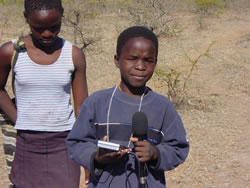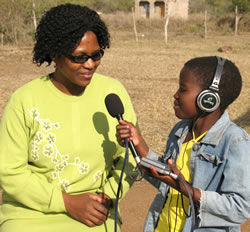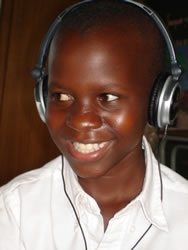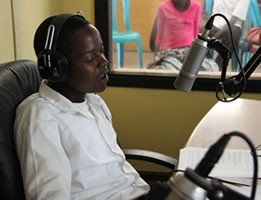About the children's radio project
Project Context
The rural expanse of Ingwavuma, in the far north-eastern corner of KwaZulu-Natal, South Africa, stretches across the Lebombo mountains and the Pongola river-flood plain, sharing its borders with south-eastern Swaziland and southern Mozambique. Homesteads of the roughly 180 000-strong population are built mostly from a modern stick, stone and wire version of the customary wattle and daub, some of home-cast cement blocks, and are scattered across the countryside among aloes, thorn trees and mealie crops. Homes near the main roads increasingly have access to electricity, but the vast majority are without. More than 85% of households rely on candles for lighting, and 62% of households in the district report having no access to any form of sanitation facility. Few have water piped to their yards, and most residents collect water from erratically-operating public water pumps and nearby rivers.
Here children grow up amidst extensive poverty, summer-time malaria risk, a legacy of under-resourced or absent service provision, and a burgeoning HIV epidemic. According to the national Antenatal HIV Survey 2008, 40% of pregnant women in the district are infected with HIV, a statistic which places the area firmly at the epicentre of the epidemic in South Africa. Despite HIV prevalence and the constant and visible presence of a vast amount of illness and death, there remain extraordinary silences around HIV.
It is against this backdrop that Zisize Educational Trust (a non-government organisation in the area) and the Children’s Institute (a child policy research and advocacy unit at the University of Cape Town), in collaboration with the local Okhayeni primary school, initiated the children’s radio project in 2005. The project was called the Abaqophi basOkhayeni Abaqinile – the Okhayeni Strong Recorders for the first few years of its existence.



“After my father died, the story stayed in my heart. I couldn’t tell anybody. I used to be alone all the time – not wanting to talk to people – until the sun would set … This thing has changed in my life since joining the Abaqophi.”
Promise, 10 years old, member of the Abaqophi

Project aims

- Facilitate ‘authentic’ children’s stories about their lives, interests and concerns: To provide children growing up in a context of extensive poverty and HIV with the opportunity to identify and articulate experiences and issues of importance to them, using audio/ radio as a vehicle.
- Ensure meaningful skills transfer to children: To provide children with the range of skills they need to make radio programmes from start to finish, and to progressively expand their expertise over time.
- Improve public understanding of children’s lives, experiences & perspectives growing up in a context of poverty and HIV: To facilitate broadcast and other uses of the children’s programmes for local, national and international audiences in order to challenge adults to consider and address children’s needs and experiences appropriately (in their families, in the community, in approaches to interventions, in policy).
- Facilitate a supportive environment and related interventions: To support children growing up in a difficult context by creating a space in which they can feel safe to talk about their problems and to assist them when they need it.

”I never realised that my child felt the pain of what we were going through at that time in our lives. I didn’t think children were aware of so much that is going on around them.”
Mother of child participant in the Abaqophi

Project methods and activities
Children between 9 and 17 years old are grouped by age and location into a handful of groups that meet for weekly after-school sessions and holiday workshops. Each are at different levels of technical skill, making programmes that range from personal radio diaries to commentaries, audio profiles, features and documentaries.
Children are facilitated through a series of ongoing processes. Ages range from 9 – 12 years old on entry into the project. Over a period of six months, each new group of children writes and illustrates books about their own lives. The process enables the children to develop oral history skills, and to explore personal narratives from which they draw when making their radio diaries. It has also proved to be critical for developing trust amongst the children, and between the children and facilitators.
The children subsequently participate in a radio-diary training workshop in which they learn about interviewing, sound, technical radio production skills and record their personal radio narratives.
Once radio-diary production is complete, children receive additional participatory training on an ongoing basis to expand and consolidate their radio skills. They continue to produce programmes on issues that interest or concern them; first identifying an issue they all agree is important to explore, planning who should be interviewed, what questions to ask, who should do what, recording material and finally collaboratively scripting and narrating the programme for broadcast.
The children – who named themselves the Abaqophi BakwaZisize Abakhanyayo: the Shining Recorders of Zisize – also present a regular slot on the local Maputaland Community Radio station, during which time they air their pre-recorded programmes, facilitate related live discussions in studio and with listeners, and report on news collected from schools in the area.


“I learned that a person living with HIV can live a long time and that people who take ARVs can look like people who don't have HIV …"
Prettygirl, 11 years old, commenting on one of the things she has learned through the process of making a programme on HIV

Positive repercussions

Child-participatory media processes – if appropriately designed - can have a range of positive repercussions. Some of those observed in the project to date include:
- Increases in children’s confidence;
- Improvements in children’s sense of being able to make positive choices for themselves;
- Children’s new or improved knowledge and skills, including in story-telling and interviewing techniques, critical thinking, a range of art techniques, basic facilitation of groups, and in radio programme production and live broadcast;
- The development of children’s ability to identify and ask critical questions of themselves and others in a range of situations;
- Improved capacity and courage amongst children to share their feelings and opinions to positive personal effect;
- Clear impacts on adults who have heard the programmes, and an improvement in their understanding of children’s capacity and needs;
- The development of a relationship between children and their school, and children, their families, and support organisation Zisize, that did not previously exist with such depth or trust on the part of the children;
- Value for researchers and child advocates who are interested in learning lessons from and about children.
The project’s positive role in creating a supportive environment for children is a key impetus for its ongoing work. In particular, the project team sees as critical the role of the project in building trust and understanding between children and their school, Zisize, their caregivers and on a much broader scale adults in general; in identifying vulnerability; in facilitating opportunities for children facing extreme personal difficulties to access support, information and skills (and to share these with others); and – importantly – in contributing to the design of interventions for vulnerable children.
The use of radio as medium in an area like this enables the project to have localised positive impacts on children and those around them, as well as to extend children’s messages and educate multiple difference audiences about their needs. These include community members, decision-makers, NGOs and others providing interventions for children, and donors, amongst others. Critically, radio is the primary media vehicle that is accessible to most local residents, adults and children alike.
For a more detailed reflection on the methods and effects of the project, see:
Meintjes, H (2009) Growing up in a time of AIDS: the Abaqophi BakwaZisize Abakhanyayo children’s radio project. Case Study prepared on behalf of Clacherty & Associates for the Regional Inter Agency Task Team on HIV and AIDS (RIATT), December 2009

“I have joined the group called Abaqophi and I am very happy … This thing [group] makes me not shy anymore, I am not afraid anymore …”
Lucky, 12 years old, member of the Abaqophi

Realising children’s right to participation and freedom of expression

Despite the provisions in the United Nations Convention on the Rights of the Child for children’s rights to participation and freedom of expression (Articles 12 and 13), children’s participation and communication regarding issues that affect their own lives continue to be a rare privilege for many children in the world, including children growing up in contemporary Ingwavuma. The extraordinary silences in this community about the presence of an HIV epidemic that wreaks havoc on both children’s and adults’ lives make it all the more critical to provide children with opportunities to access information and voice their experiences and needs. Proper understanding of children’s needs, a grasp of the ways in which children experience and make sense of the world around them, insight into children’s priorities in a context of struggle – all these are key to responding to the impact of the epidemic on children’s lives.
In the context of the Convention on the Rights of the Child, participation entails the act of encouraging and enabling children to make their views known on the issues that affect them. Providing children with opportunities to produce their own media is one of the most powerful ways in which we can give effect to this right.

“You may give a voice to the children, even give them a very big platform, but if adults don’t stop to listen to what the children are saying, it is as good as no voice.”
Nonjabulo, member of the Abaqophi, introducing a live broadcast

Funders

The project has to date been grateful for the financial support of IBIS and the United Nations Association for the United States of America HERO project (2005); the Open Society Foundation (2005-2008); Stop AIDS Now (2006), the Children's Radio Foundation (2008), the Nelson Mandela Children's Fund (2011) and the Media Development and Diversity Agency (2007-2009, 2011)

“Some people take our messages to heart - for example if they are going to do things with us as children, they should ask us how we feel about the things they want to do … I have seen changes at home. In the past they did not consult us on what was happening: we would just see things happening. But these days they start by asking us what we think.”
Zekhethelo, 13 years old, member of the Abaqophi


